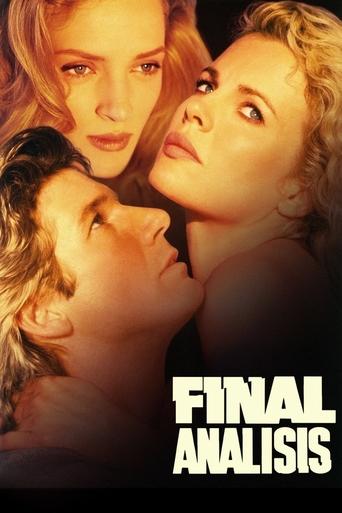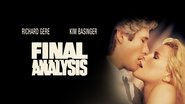tieman64
Deliberately lurid, overwrought, and sleazy, Phil Joanou's "Final Analysis" plays best if you pretend it's a black and white psycho-sexual noir from the 1950s; the kind of pulpy B movie routinely rendered classy by guys like Fritz Lang or Alfred Hitchcock ("Rebecca", "Vertigo", "Notorious" etc).Joanou's no Hitchcock, of course, but his compositions are brilliant in the way they emphasize clean lines and geometric shapes, and the film's cinematography, by the legendary Jordan Cronenweth (Blade Runner), is also very special."Final Analysis'" plot is standard of the genre - Richard Gere plays a poor schmuck who may or may not be at the mercy of two sisters (Uma Thurman and Kim Basinger) who may or may not be femme fatales – but the film is aiming for familiarity. It then ends with a bad Hitchcockian cliffhanger, Gere literally hanging from the edge of a lighthouse. Surprisingly, the film's first half is rather restrained, played almost in whispers.7.9/10 – Classy trash, which should appeal to those craving a dose of Hitchcock. Worth one viewing.
NoName1989
I don't really understand why this film has such a low rating. Most of the movie is very good. The story, the acting and the cinematography are very good. The story also has a lot of plot twists and the acting is very good. The screenplay is quite intelligent. Only the end is a bit less good, and that's a pity, because this could have been a masterpiece. The end is a bit stupid. Phil Joanou did a good job directing this film. It's a pity this film doesn't get a higher rating on IMDb. Richard Gere, Kim Basinger and Uma Thurman do a good job too. I recommend this film. It's not a masterpiece, but it's certainly not bad.
mysteriesfan
This movie has some promising elements. There is a premeditated murder plot with some intricacy, twists, and atmosphere. Kim Basinger is good playing a beautiful mystery woman with a troubled past and an exotic, violent illness ("pathological intoxication"). She conveys soft, placid (if overly simple) beauty one minute and psychotic rage the next, rivaling Catherine Zeta-Jones' in "Traffic" in her ability to turn memorably driven, tough, and hard-hearted on a dime.Uma Thurman looks and acts her slight part adequately enough as Basinger's delicate, spaced-out sister, a patient of Richard Gere. Paul Guilfoyle hams it up as a boorish criminal defense lawyer pal of Gere's. A police detective is tough, crude, and menacing, on cue (barking at Gere, "Don't yank my dick").But the film collapses under the weight of its many flaws. Gere is completely unconvincing as an "eminent psychiatrist." This has less to do with how he looks than how the movie presents him. He never says or does anything to credibly establish such a character. His attempts seem limited to occasionally speaking in jargon or hushed tones. He appears gullible and ignorant, as when it takes someone else's lecture to tip him off by chance to a colorful passage in Freud's work that is key to the criminal's scheme; even one of the plotters had expected Gere to be familiar with it. His supposedly joking answer to Basinger that as a psychiatrist he simply repeats, as a question, whichever last two words his patient speaks -- "'Your mother?'" -- hits a little too close to home. It is a truer description of how Gere comes across here than he thinks. Nor does the film give any background that might help explain the personal vulnerability that makes him such a dupe. The character is little more than a dim, steady facial expression and a resume.Thurman's character amounts to no more than a stagey plot gimmick. She never comes alive as a real person with a real relationship to anyone. The prosecutor is played with gruff style and no substance by Harris Yulin. He is given so little to say and do, and the character accomplishes so little, if anything, that I could not even find him listed in the credits.Even worse is the Eric Roberts character, Basinger's intense husband with mob ties. It is a tired, superficial, trying caricature that drags the movie down to the level of countless low-budget, rip-off "romantic thrillers." The unoriginal character and portrayal recall cinematic gems like "Play Murder for Me" and "Dead On" (both with Tracy Scoggins), "Tryst" (with Barbara Carrera), and probably dozens of other "abusive husband" exploitation flicks and TV show episodes (ala "Silk Stalkings").The weaknesses in the characters are only compounded by the weaknesses in the story. The plot flaws become so damaging and distracting that they sap entertainment value right out of the film. Watching the movie becomes like trying to drive a stick-shift down a road full of sink-holes (the film does feature a "ditch"). The abrupt, midstream shift in tone and pacing does not help.No explanation is ever offered for how the killer was able, in real time, to "hide" the murder weapon from the police - don't they search a crime scene? don't they have search warrants for other hiding places? And this is a plot point that drives most of the movie.We are supposed to believe that the prosecutor would proceed with a first degree murder trial not only without a murder weapon but without establishing the accused's motive, not even bothering to investigate until afterward exactly who was in line to receive a $4 million payout.We are supposed to believe that Gere can install himself on the psychiatric board responsible for evaluating the fitness for release from an institution of his own, indefinitely confined lover.We are supposed to believe -- and cheer -- that two outside professionals would arrive for an interview without introducing themselves or their reason for being there, and that another character would suddenly switch a lifelong allegiance, all so that Gere can stage an elaborate trick on someone he later acknowledges is mentally ill from childhood abuse, only apparently to arrange an even more haphazard, convoluted, and contrived manipulation later by behaving cavalierly and roughly to a patient.We are supposed to believe that murderers can walk out of mental institutions simply by switching clothes with someone else in a bathroom.We are supposed to believe that Gere would enlist a psychiatric patient to steal for him, without giving any warnings or taking any precautions to protect the young man from the vicious homicidal maniac with whom this puts him at odds (to compensate for this colossal error, the movie prematurely discloses the man's fate, creating a witness and another potential crime to prosecute and thus undercutting the suspense of whether the killer of the earlier victim will escape unpunished).We are supposed to believe, for the sake of a quick, shock-effect touch at the end, that, after two court trials had thoroughly publicized the events of the case, a character at its heart would appear to be recycling the exact same modus operandi for future use. And so on.The movie suffers badly under the relentless battering of these accumulated character and plot problems. Simply dismissing them with an air of glib pseudo-sophistication, all-knowing cynicism, empty flippancy, or lazy, unintelligent flicking of the "not helpful" button on any review honest enough to point them out is not a serious response. Nor do they simply disappear because the movie inserts some attractive visuals, such as of bridges and lighthouses, or ramps up dramatic music (somewhat frantically and mechanically, starting about halfway through). Any meaningful review has to come to terms not only with the elements of the movie that are promising and likable but with the substantial flaws that prevent it from being satisfying.






